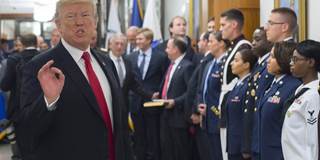A great-power conflict is in no way unavoidable, unless these powers act as if it were. The greatest risk is that the US forgets the principles and institutions that have shored up its global leadership and, by emphasizing a narrative of confrontation, exposes the world to a self-fulfilling prophecy.
MUNICH – Multipolarity is back, and with it strategic rivalry among the great powers. The re-emergence of China and the return of Russia to the forefront of global politics are two of the most salient international dynamics of the century thus far. During Donald Trump’s first year in the White House, the tension between the United States and these two countries increased markedly. As the US domestic political environment has deteriorated, so, too, have America’s relations with those that are perceived as its principal adversaries.
When China’s President Xi Jinping rose to power just over five years ago, he presented the idea of a “new type of great power relations” based on cooperation and dialogue, as well as respect for one another’s national interests. But China does not always live by what it preaches as far as cooperation is concerned, as its unilateralism in the South China Sea indicates. Likewise, the relative loss of influence of the Chinese diplomatic corps contrasts with the emerging symbiosis between Xi and the People’s Liberation Army. Xi has even shown a surprising predisposition to wear a military uniform.
Russia, for its part, has invaded two former Soviet republics in the last decade, and its military spending as a share of GDP has been increasing almost exponentially. On top of this, the US and Russia have accused each other of violating the Intermediate-Range Nuclear Forces Treaty, the only Cold War-era agreement on armaments between the two countries that remains in force.

MUNICH – Multipolarity is back, and with it strategic rivalry among the great powers. The re-emergence of China and the return of Russia to the forefront of global politics are two of the most salient international dynamics of the century thus far. During Donald Trump’s first year in the White House, the tension between the United States and these two countries increased markedly. As the US domestic political environment has deteriorated, so, too, have America’s relations with those that are perceived as its principal adversaries.
When China’s President Xi Jinping rose to power just over five years ago, he presented the idea of a “new type of great power relations” based on cooperation and dialogue, as well as respect for one another’s national interests. But China does not always live by what it preaches as far as cooperation is concerned, as its unilateralism in the South China Sea indicates. Likewise, the relative loss of influence of the Chinese diplomatic corps contrasts with the emerging symbiosis between Xi and the People’s Liberation Army. Xi has even shown a surprising predisposition to wear a military uniform.
Russia, for its part, has invaded two former Soviet republics in the last decade, and its military spending as a share of GDP has been increasing almost exponentially. On top of this, the US and Russia have accused each other of violating the Intermediate-Range Nuclear Forces Treaty, the only Cold War-era agreement on armaments between the two countries that remains in force.